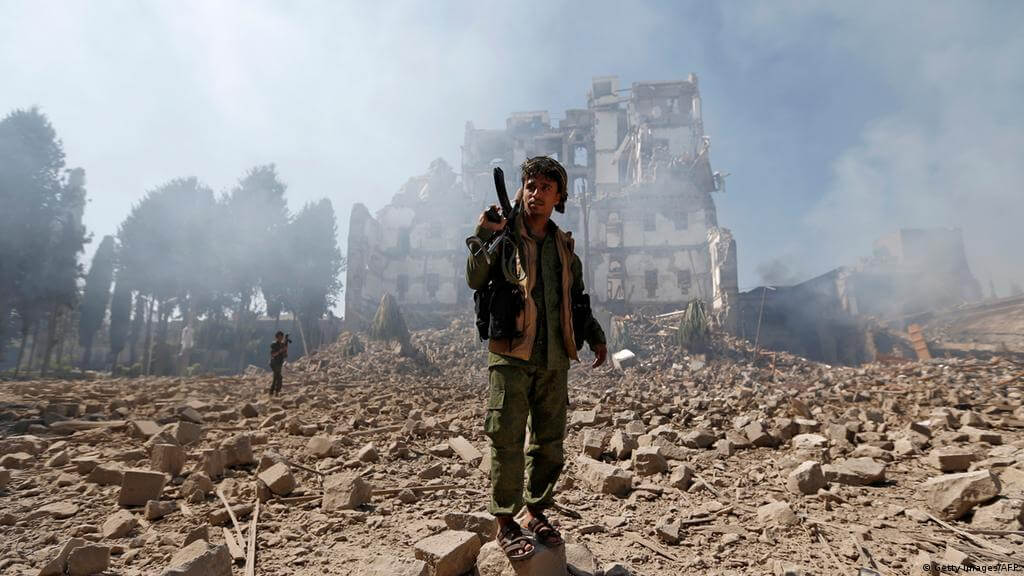Yemen’s Houthi rebels have rejected the Saudi-led coalition’s declaration of a ceasefire on Thursday, a day after the rebels called for suspending attacks on Saudi Arabia. The ceasefire was announced ahead of peace talks between different Yemeni factions in Riyadh on Wednesday.
Houthi official Mohammed al-Bukaiti said that unless the coalition lifts the blockade on Yemeni ports and ends the closure of the Sana’a airport, the Houthis will not comply with any Gulf initiative for peace. “If the blockade is not lifted, the declaration of the coalition of aggression to stop its military operations will be meaningless because the suffering of Yemenis as a result of the blockade is more severe than the war itself,” he said, adding that the Houthis will continue military operations “aimed at breaking the siege.”
Moreover, the group’s political leader, Mahdi al-Mashat, said that the talks in Riyadh “have nothing to do with peace, arguing that their goal is to arrange the internal situation for mercenaries” to fight in Yemen. He stressed that their demands for lifting the Saudi siege on its infrastructure are based on the genuine rights of the Yemeni people and warned coalition countries to prepare for “surprises in the future” if they refuse to lift the restrictions.
Mahdi also noted that the Houthis are ready for serious peace negotiations in a “neutral country.” He noted that Yemen will not become a “back garden” for countries to impose their will and stressed that Yemen will continue to fight for its sovereignty and the rights of its people. “They want to impose their will on us, and it is our right not to accept any proposals that contradict the demands and will of our people,” Mahdi added.
The Coalition declared cessation of military operations in Yemen to create a conducive environment for consultations. In April 2020, the Houthis responded to the cease-fire ahead of Ramadan by redploying militants to Marib. It remains to be seen how they will act differently. https://t.co/WJclvz4nok
— Ibrahim Jalal 🇾🇪 إبراهيم جلال (@Ibrahim4Yemen) March 29, 2022
The Saudi-led coalition announced a halt to all military activities in Yemen from Wednesday throughout the Muslim Holy month of Ramadan and said that the ceasefire is meant to facilitate peace talks aimed at ending the seven-year-long war.
Hundreds of Yemeni politicians, activists and tribal leaders, journalists and many others have arrived here for talks that will officially begin tomorrow #Yemen #Riyadh pic.twitter.com/w4CdMHwcHs
— Saeed Al-Batati (@saeedalBatati) March 29, 2022
Coalition spokesperson Turki al-Maliki said on Tuesday that Yemeni factions will gather in Riyadh for talks aimed at achieving “security and stability” and reaching a “comprehensive, sustainable resolution” to the war. Al-Maliki added that talks are being backed by the United Nations.
The announcement came a day after the Houthis said they had suspended all attacks on Saudi Arabia for three days, wherein they stressed that they could consider such an arrangement as a “permanent commitment” if the coalition announces the withdrawal of all foreign forces.
However, the Houthi offer was rejected by coalition members, who launched deadly strikes on rebel camps in Sana’a, Hodeidah, and Ma’rib on Sunday. A day earlier, the coalition launched strikes against the rebels in Sana’a and Hodeidah, killing eight people, in response to a wave of ballistic missile and drone attacks on Saudi Arabia.
On Friday, the Houthis launched a barrage of missiles on Saudi Arabia that also struck an Aramco oil facility in Jeddah where a Formula One race was scheduled to take place two days later.
The unrest in Yemen began in 2014 when a civil war broke out between the Houthis and the internationally recognised Yemeni government, which was ousted in the same year by the rebels. In 2015, a Saudi-led coalition, including the UAE, launched a major offensive in Yemen by conducting airstrikes on Houthi-controlled areas. Since then, there has been no end in sight to the war, and international efforts to halt the fighting have largely failed.
The war has killed more than 130,000 people, with the United Nations calling the conflict in Yemen “the world’s worst humanitarian crisis.”

